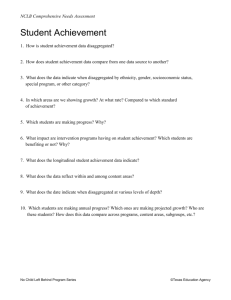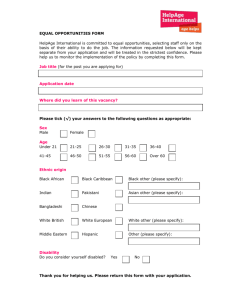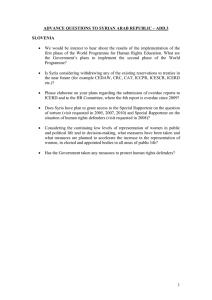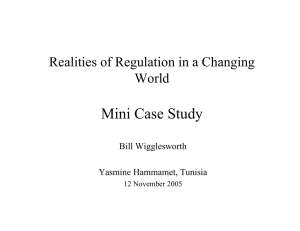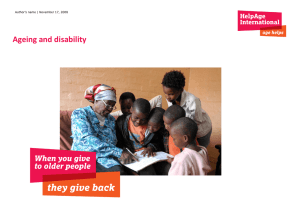Health and human rights of older persons: challenges and opportunities
advertisement
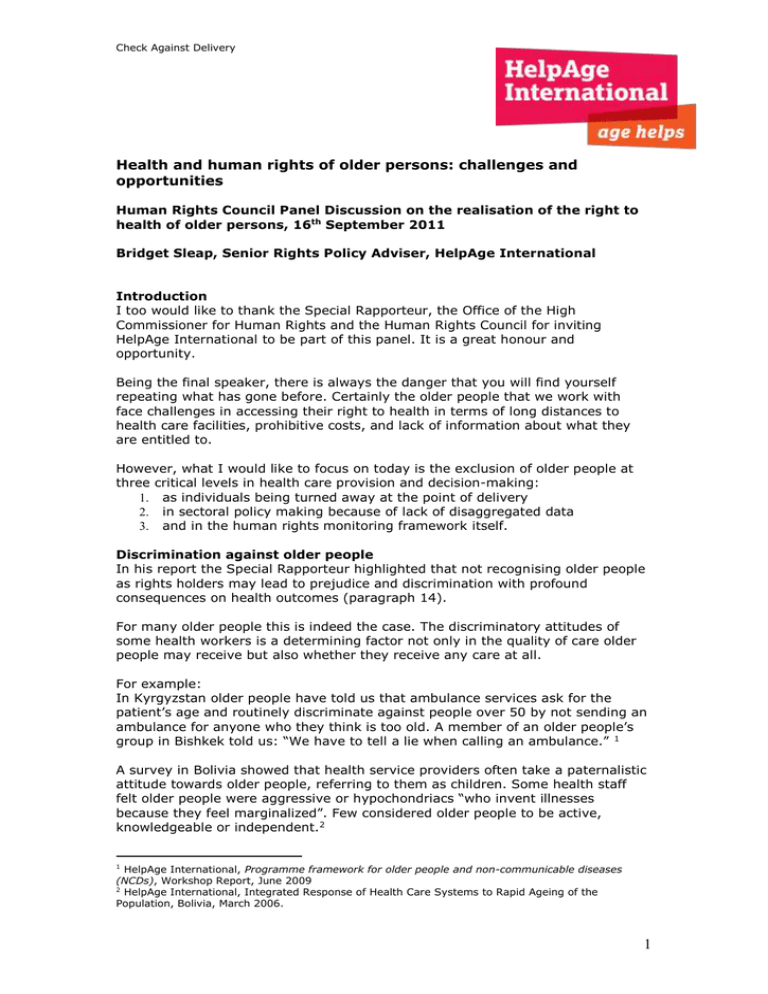
Check Against Delivery Health and human rights of older persons: challenges and opportunities Human Rights Council Panel Discussion on the realisation of the right to health of older persons, 16th September 2011 Bridget Sleap, Senior Rights Policy Adviser, HelpAge International Introduction I too would like to thank the Special Rapporteur, the Office of the High Commissioner for Human Rights and the Human Rights Council for inviting HelpAge International to be part of this panel. It is a great honour and opportunity. Being the final speaker, there is always the danger that you will find yourself repeating what has gone before. Certainly the older people that we work with face challenges in accessing their right to health in terms of long distances to health care facilities, prohibitive costs, and lack of information about what they are entitled to. However, what I would like to focus on today is the exclusion of older people at three critical levels in health care provision and decision-making: 1. as individuals being turned away at the point of delivery 2. in sectoral policy making because of lack of disaggregated data 3. and in the human rights monitoring framework itself. Discrimination against older people In his report the Special Rapporteur highlighted that not recognising older people as rights holders may lead to prejudice and discrimination with profound consequences on health outcomes (paragraph 14). For many older people this is indeed the case. The discriminatory attitudes of some health workers is a determining factor not only in the quality of care older people may receive but also whether they receive any care at all. For example: In Kyrgyzstan older people have told us that ambulance services ask for the patient’s age and routinely discriminate against people over 50 by not sending an ambulance for anyone who they think is too old. A member of an older people’s group in Bishkek told us: “We have to tell a lie when calling an ambulance.” 1 A survey in Bolivia showed that health service providers often take a paternalistic attitude towards older people, referring to them as children. Some health staff felt older people were aggressive or hypochondriacs “who invent illnesses because they feel marginalized”. Few considered older people to be active, knowledgeable or independent.2 HelpAge International, Programme framework for older people and non-communicable diseases (NCDs), Workshop Report, June 2009 2 HelpAge International, Integrated Response of Health Care Systems to Rapid Ageing of the Population, Bolivia, March 2006. 1 1 Check Against Delivery These discriminatory practices can also be found in post conflict or humanitarian settings. In Northern Uganda, for example, displaced older people unable to return to their villages of origin were frequently told that they were wasting the doctor’s time - that they were not sick, just old3. Exclusion from sectoral policy decision making But it is not only at the individual level that older people are being denied access to appropriate health care because of their age. Although the discrimination may be more indirect, the focus in many low and middle income countries on mother and child health and curative services, and the influence of the MDGs, have all led to health systems that pay little attention to health across the lifecourse and health in old age. Added to this, the failure to collect, analyse and disseminate data disaggregated by age often means that older people’s specific circumstances are not considered in health policy decision making. This is particularly apparent in the response to HIV and AIDS where older people are rarely the target of prevention, treatment and care programmes because prevalence rates are usually only available for people between the ages of 15 and 49. The failure to collect data on violence against women over the age of 49 has a similar effect. Data is also often unavailable on wider health systems. In a cross-regional review of 32 countries, we found that: Data on the use of health-care facilities disaggregated by age and sex was available for just half of the countries. Data on the numbers of health care facilities with geriatric wards was only available in 44%. Data on older people’s health expenditure was only available in 28%. And data on government expenditure on health disaggregated by age was only available in 19% of the countries.4 This lack of data makes it impossible for States Parties to progressively realise and effectively monitor the implementation of older people’s right to health. Invisibility in the human rights monitoring framework In his report, the Special Rapporteur reminds us that failure to monitor implementation at the national level is a violation of states obligations (paragraph 31). To try and assess the extent to which States Parties are monitoring implementation of this right, we carried out a review of treaty body and special procedure documents since the year 2000 that are available on the Universal Index of Human Rights website. In this review we searched for all the references Erb,S, The Protection of Older People in Northern Uganda: Needs, Contributions and Barriers to Return, June 2008 4 HelpAge International & UNFPA, Overview of Available Policies and Legislation, Data and Research, and Institutional Arrangements Relating to Older Persons – Progress Since MIPAA, 2011, p 45 3 2 Check Against Delivery to old age, the elderly and to older persons or women. We recognise the limitations of this type of study but its findings are indicative and quite revealing. Firstly, we found that attention to older people’s rights more generally has been highly inconsistent across the treaty bodies. Treaty Body No. of references CEDAW 295 CESCR 75 CAT 5 HRC 4 CERD 2 And when we looked specifically at the right to health, we found that attention to this too has been sporadic and inconsistent across the different mechanisms. CEDAW Right to 38 Health CESCR SR on SR on SR on SR on Total IDPs housing E,S & A indigenous no. Ex. people 15 4 - 2 1 60 So what does this all tell us? The Committee on Economic, Social and Cultural Rights reviewed 124 State Party reports for the period of this review but we only found 15 references to older people’s right to health. It is clear then that older people remain virtually invisible in the present monitoring of the right to health and that the 1995 and 2000 General Comments referred to in the Special Rapporteur’s report have not resulted in systematic or consistent consideration of older people’s right to health. In addition, we also found that the vast majority of references were to older people or older women in a longer list of vulnerable groups, with no substantive detail on the application of the right to health to their specific circumstances. This certainly raises questions as to whether existing standards provide adequate 3 Check Against Delivery norms and guidance on how State Parties should realise the right to health in the present context of demographic ageing. Opportunities The Special Rapporteur’s report is a major contribution to better understanding this specific application and we fully support the national policy recommendations he makes, including the training of health workers in treating older people as a way to reduce discriminatory attitudes and practices. There is, however, we believe, much more that the international human rights system and Human Rights Council can do to strengthen the protection of older people’s right to health. States Parties can provide much more information disaggregated by age and sex in their periodic reporting to treaty bodies. Treaty bodies can give more active consideration to older people’s right to health: in their list of issues to States Parties, in their constructive dialogues and in concluding observations and comments. Special Procedures, too, can examine how older people’s right to health intersects with their mandates. For example the Special Rapporteur on violence against women could examine the impact that violence and abuse against older women has on their health. The Universal Periodic Review also provides the opportunity to examine the extent to which all UN Member States are protecting older people’s right to health. And finally, we recommend that the Human Rights Council consider the suggestions from the OEWG on Ageing of creating a new special rapporteur and convention on the rights of older people as opportunities to afford older people greater protection of all their rights, including their right to health. 4

